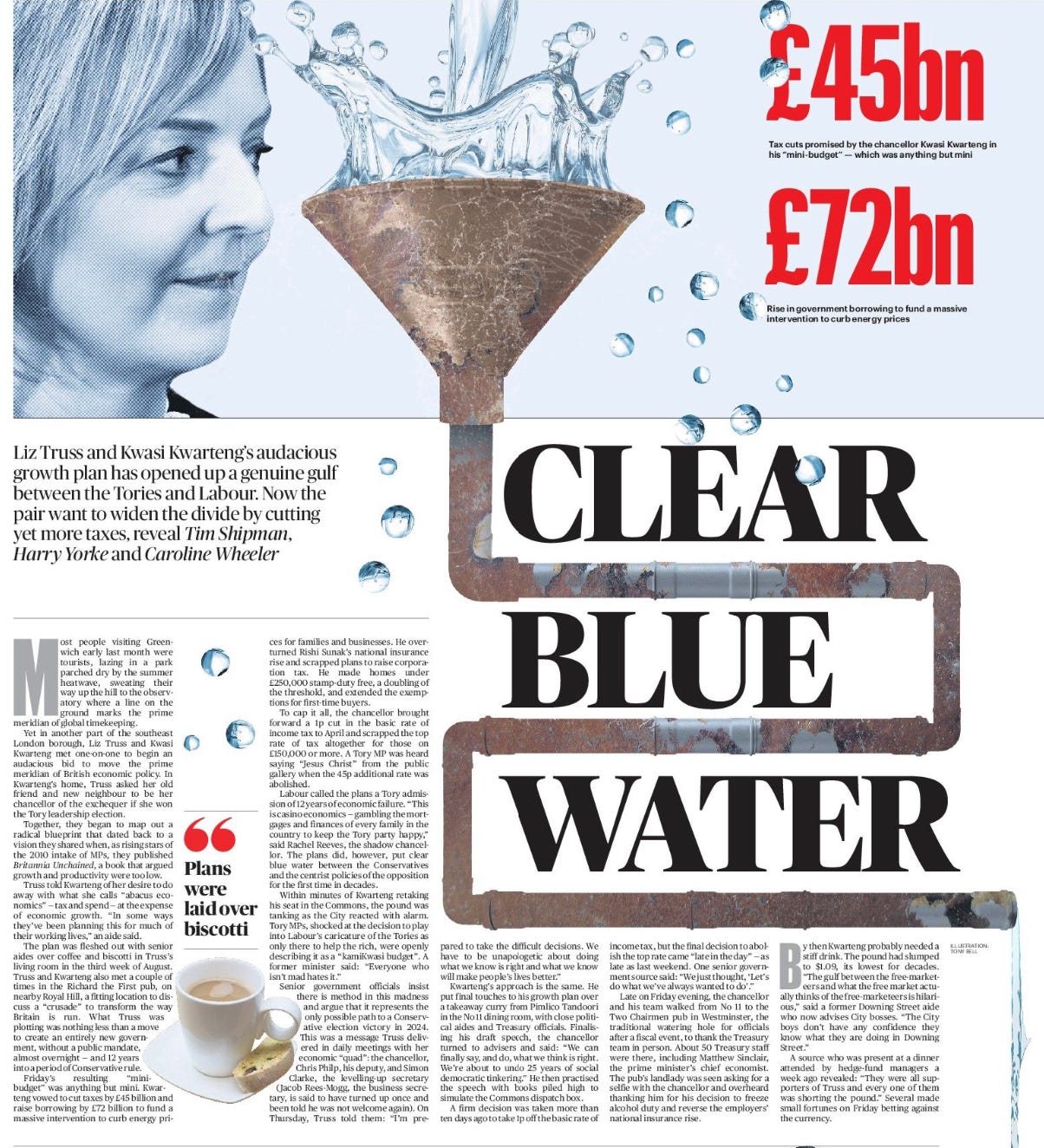Now that we have seen the so-called “mini-budget,” there is plenty of speculation about what comes next. As a reminder, the Truss/Kwarteng budget, which was reportedly “fleshed out with senior aides over coffee and biscotti in Truss’s living room in the third week of August,” is a huge gamble on supply-side economics. And it’s only the beginning.
The next shoe to drop comes later in the year when the rest of the government’s fiscal plan is released. With the mini-budget roiling currency and bond markets, many observers expect Truss and Kwarteng to announce massive spending cuts to the public sector in order to “restore market confidence.” If you remember anything about the Reagan era and David Stockman’s playbook, then you know how this game is played: (1) push through massive tax cuts that disproportionately benefit the rich; (2) claim the tax cuts will “pay for” themselves through higher growth; (3) watch the debt and deficit soar; (4) clutch pearls; (5) demand cuts to public programs as the only alternative (TINA).
Already, some economists are asking whether the mini-budget should be viewed “a Trojan horse for a massive attack on the welfare state.” Such an attack would be politically unpopular. Unless, of course, it could be carried out under the cover of TINA. The economics editor at The Spectator, has speculated that the mini-budget will push the Bank of England to hike interest rates even more aggressively. If they do, she says it might be “a design feature, not a design flaw, of Truss’s plan.”
It might sound far-fetched, but as Professor Gabor of the University of West England, Bristol notes, “borrowing requirements would fall a lot if say, UK government [were to] announce a massive cut in NHS spending, education, no net zero, privatisation of strategic assets (NHS again) to contain pressures on sterling/gilts.”
PS Don’t miss the last paragraph in the article above. And then—if you can navigate the paywall—read this. You’d be forgiven for being tricked into believing every word.






Is the UK Labor Party so inept that it can’t mount a credible attack on these outdated and destructive Tory policies? Two weeks into her tenure and Liz Truss seems intent on proving herself a high-functioning monetary moron. Unlearned history is repeating itself in Truss’ Thatcher-era mistakes.
"It might sound far fetched ..."
Not that far-fetched if you read this:
https://www.cato.org/white-paper/ideal-us-uk-free-trade-agreement-free-traders-perspective
and, in particular, the Epilogue in which you will find this:
"As for other services areas, health services are an area where both sides would benefit from openness to foreign competition, although we recognize any changes to existing regulations will be extremely controversial. Perhaps, then, for other areas the initial focus should be on other fields such as education or legal services, where negotiators can test the waters and see what is possible. That said, we would envisage a swift, time‐tabled implementation of recognition across all areas within 5 years"
Now, if you had executed a Brexit which enabled you to make changes to existing regulations under some draconian powers, (like, for example, those granted by the The European Union [Withdrawal Agreement] Act 2020 ), and you wanted to sell off and terminate the NHS, (like the Tories have done for time immemorial), and you took your advice from, among others, the CATO Institute and 5 years seemed like a rather attractive timeframe to achieve that in, then wouldn't it be rather a good idea to "announce a massive cut in NHS spending, education, no net zero, privatisation of strategic assets (NHS again) to contain pressures on sterling/gilts.”.
Because this may be a really stupid and destructive mini-budget or it may just be an unconstrained cabinet putting the finishing touches to nailing the crown jewels of Brexit - full privatisation of the NHS and sell-off to multinational healthcare corporates.
After all Brexit was never about the things in the sales pitch and was always about selling off England and its public sector by the (conveniently cheapened) pound and handing its user base (the UK population) over to the corporates as an economically enslaved user base.
Maybe not a stupid budget - a horrible, cruel one, but also a dead cat masterstroke.